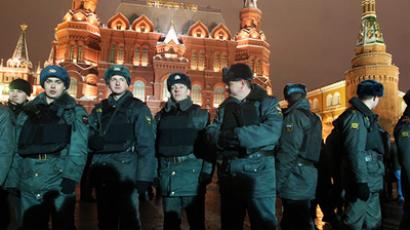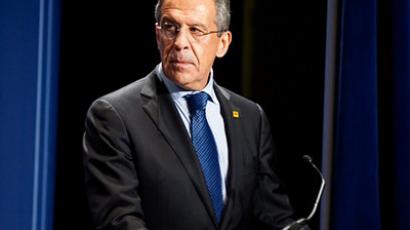Lugovoy points to possible killers of Litvinenko
Andrey Lugovoy, who is accused of murdering former FSB officer Aleksandr Litvinenko, denies his guilt. In an exclusive interview with RT he shares at least four versions of who could be to blame for Litvinenko murder.
Andrey Lugovoy and Marina Litvinenko, the widow of the deceased, are demanding an extended court hearing be held into the case, but the UK government is opposed to such a session.The reopened hearing in the case into Litvinenko’s poisoning started on October 13 in London. But it was not a “classic court hearing” Andrey Lugovoy claimed.“This session of the so-called Coroner's Court, or a forensic expert court, should mainly determine the cause of death, and whether it was a violent death or not,” Lugovoy said.This kind of hearing, which he says doesn't exist in Russian or even European criminal proceedings, “is finally taking place now,” five years later.It is hoped the Coroner’s inquest will find maybe something what CCTV missed, determine once and for all what went on behind walls of Millenium Hotel in Central London, where Litvinenko met Lugovoy for breakfast the morning former FSB officer fell ill.But Lugovoy feels it is unlikely that it will give decent answers to all questions in this twisted case because “a session held in the narrow format is usually brought down to just stating the fact and cause of someone’s death,” he explains. Lugovoy, who hasn’t left Russia since 2006 because of an international arrest warrant, himself suggested to the court that he would take the stand via video conference.“Our appearance at this hearing created a real stir among other participants. Lawyers, Litvinenko's family, Berezovsky's lawyer, and representatives of the British government didn't expect us to show up there,” Lugovoy says. He confesses now it was a surprise to him and his lawyers that his defense team was recognized as a concerned party. Lugovoy’s participation at the hearing, though via video, could never have happened if lawyers had not “heard about it at their local gatherings.”“Therefore in late September we filed a special petition to this coroner's session to recognize us as a concerned party,” he says.Now he and the injured party, the widow Marina Litvinenko, are insisting that an extended court meeting should be held. He stressed they have similar stances and they are both insisting on an extended court session. “Since the court met only in a narrow format, she and I demanded that an extended court meeting should be held.” Lugovoy said. “An extended meeting would have enabled us to provide some evidence to call in additional witnesses and give some explanations…"'
Blindspots in the case
For Andrey Lugovoy, who categorically denies his involvement in the murder of Litvinenko in November 2006, the case still leaves a lot of questions. He says all accusations are based on Litvinenko’s alleged last words to Berezovsky while the latter was visiting the poisoned Litvinenko in hospital.“I always wondered about something. If they took photos of Litvinenko and recorded his evidence, and if Berezovsky and Goldfarb managed to bring a photographer to his ward, what stopped them from bringing a video camera or a voice recorder, other than a photographer, and record him saying that he was blaming me? Nothing of this kind was done… There was no evidence to it.”Lugovoy says it was unexpected when his name came up immediately after Litvinenko’s death.He remembers that their talk with Litvinenko after he had already been poisoned was “more than friendly” and it even seems to him that Litvinenko “sounded quite cheerful.”“He was making plans, and wasn't blaming me for anything,” Lugovoy explains. And here once again the question of who is to blame arises. Who could have profited from the poisoning of the former FSB officer?
Litvinenko's Big Four
And Lugovoy names four suspects that came to his mind.In the first place Berezovsky, he says, as Litvinenko knew how he should apply for a political asylum. “Given Berezovsky’s love of intrigue, I think that this is quite possible.”Secondly, the British security services could have been involved, Lugovoy goes on. “I don’t want to say that they had masterminded that murder, though anything can be expected from these guys.”Recently, Marina Litvinenko admitted that her husband had co-operated with the British intelligence services MI5 and MI6.In the interview with the BBC Russian Service, she said that her husband was not working for MI5 or MI6 per se, but rather “did consultancy work for them in an operation to combat Russian organized crime in Europe,” in particular Spain, and got “tens of thousands of pounds” for his services.But Lugovoy believes that, in saying this, Litvinenko’s widow was being rather devious. He believes she was not saying the whole truth.Lugovoy believes that for such powerful and “cynical” security services as MI5 and MI6 organized crime is not something they are really concerned with. “So saying that Mi-5 and Mi-6 are interested in organized crime is, in my view, equal to saying that RT is broadcasting on order from some extraterrestrial organization. Litvinenko definitely worked in the interests of intelligence and counter-intelligence services,” he says. And “since Litvinenko was a British spy” he followed somebody’s instructions in compliance with the rules and discipline existing in the organization he worked for.“So it means that the British secret services were somewhere near and could be linked to Litvinenko’s death,” Lugovoy concludes.Thirdly, Lugovoy says that as Litvinenko helped the Spanish police to fight the Russian mafia and provided them with information it also should be taken into account.And Lugovoy’s fourth version of Litvinenko’s death links the case to Georgia. “Litvinenko visited Georgia and the Pankisi Gorge many times. Some Russian officials claim that he had been there shortly before a huge militant attack in Nalchik, the Republic of Kabardino-Balkaria. He was in touch with terrorists and he visited Istanbul many times. He mentioned some strange meetings with terrorists in the territories of European countries. So I don’t rule out that he became the victim of some joint action or provocation.”Litvinenko died a slow and painful death – after ingesting the lethal radioactive substance polonium 210.The unsolved case has been the thorn in the side of British Russian relations – with Moscow refusing to extradite London’s chief suspect.














